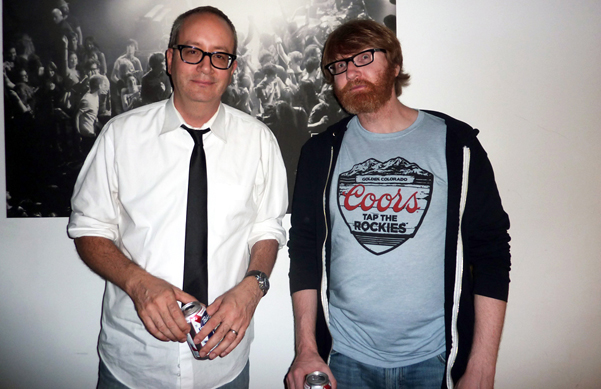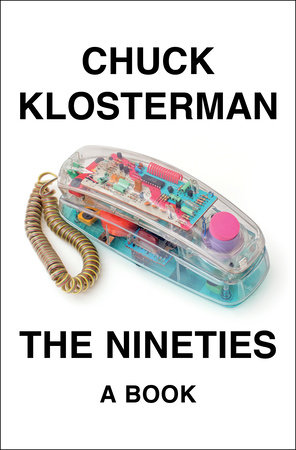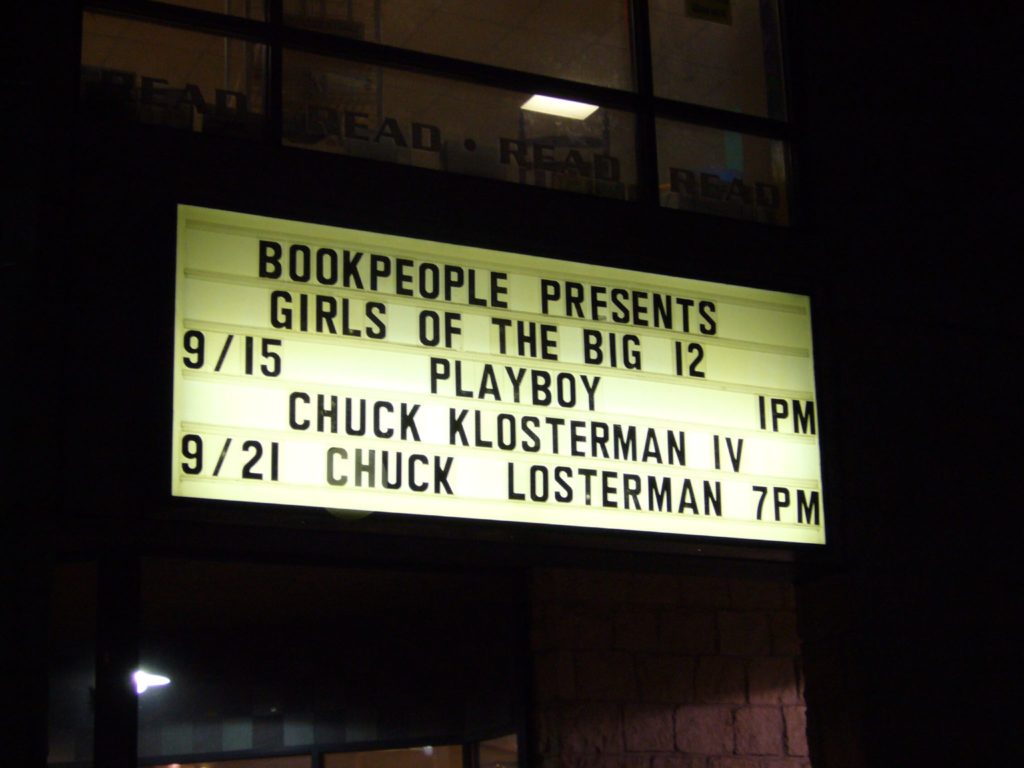“[W]hat I have come to realize is that those four or five years represent the only time when things can seem new. When you’re a teenager, you can’t appreciate innovation intellectually and when you reach 30, you can’t enjoy innovation viscerally. And yet there is a very specific window of time when newness can feel truly authentic, and it’s a really amazing moment in your life.”
“…I miss when things were new.”– Chuck Klosterman, “Out of Time,” SPIN
In 2004, Chuck Klosterman wrote an essay for SPIN titled “Out of Time,” wherein, as the quote above says, he asserted the following: that our individual conceptions of newness are shaped by our experiences during the ages of 20 to 25; consequently, our reception of the world and of culture is forever mediated through this fixed understanding. It is difficult to overstate the social significance of this claim. Because although it is presented as an objective fact (and it very well may be), its truth is dependent upon subjective factors. It requires an affirmative answer to this question: Do you remember a time when things were new?
As you’re reading this, Chuck Klosterman’s latest work, The Nineties: A Book, is experiencing what one can only assume is a successful release. His first nonfiction book in almost six years attempts a comprehensive analysis of the texture of the 1990s — “the feeling of the era.” Perhaps no cultural critic is better suited for this task than Klosterman, and one need look no further than “Out of Time” as to why: In The Nineties, Klosterman is revisiting the period of his life when things were new. And whenever one is attempting to capture things as they once were, this relationship to newness becomes critical.
In The Nineties “Introduction” essay, Klosterman writes that the prevailing view is that the decade was “a good time that happened long ago, although not nearly as long ago as it seems.” One wonders how he managed to obtain the requisite distance necessary to make this observation. The answer resides with the cultural environment in which The Nineties was produced: Klosterman’s status as a cultural critic and the practice of cultural criticism, broadly speaking. It resides in a time and place that no longer exists — but also the antiquated perspective that our subjective experiences do not define the world. Because as it turns out, the distance created by this return is one of the few ways we are able to experience our current cultural present.
After all, it is only through distance that anything seems new.

If you’re reading this essay, you most likely do not need an introduction to Chuck Klosterman. But on the off chance you are the SPIN reader who entered this essay expecting an artist profile, here’s some backstory: Klosterman began his professional writing career as a newspaper reporter back when reporting the news was still something we did in print outside of New York City, Los Angeles and Washington D.C. He jumped from the Akron Beacon Journal to SPIN in 2002 and shortly thereafter wrote Sex, Drugs, and Cocoa Puffs — a collection of essays that placed him on the forefront of cultural criticism. At the time of this writing, Klosterman has published 12 books for which he has been named a “New York Times Bestseller.” He has written columns for as many premier publications as we have left (e.g., GQ and Esquire); he was a consulting editor for the ESPN boutique publication Grantland, along with Dave Eggers and Malcolm Gladwell; he was, for a spell, The New York Times Ethicist.
But what you must know, first and foremost, is that Chuck Klosterman built his professional reputation on his experience as an outsider. Raised in Wyndmere, North Dakota, he matriculated at the University of North Dakota and cut his teeth in a dying industrial city in Northeast Ohio — Klosterman’s singular voice originated from a literal distance. Of course, lots of aspiring cultural critics have been outsiders; Klosterman found his way to New York because he is so goddamn good at it. But a funny thing happened along the way: he stopped writing about what got him there.
When I interviewed Klosterman, my hope was that he would address why he hasn’t written about the cultural present in more than a decade. Instead, his response to my questions regarding his recent work mirrored the shift in his critical approach from his previous work to The Nineties: he spoke to his subjective experience while expressing his desire for this book to be objective toward the past.
“I think I live in the future and the past — it is very hard for me to live in the present. I’m very bad at it. I’m always thinking about things that happened before, and I’m always wondering what will happen next. That’s just how I am.
“One thing that has really accelerated through the culture is the idea of perceiving the past through the lens of the present in every circumstance. This is a book about the 1990s — I wanted to avoid [that idea] as much as possible…but of course, the problem is I live in the future, too.”
In other words, Chuck Klosterman is attempting something new.
The following inquiry proceeds from two premises. You may disagree with either, but it is nearly impossible to disagree with both. The first premise is that American culture is changing constantly. With every new generation, our cultural center shifts. As a result, if we are able to identify such a center, it is only for a short period of time (and this period is getting shorter). The second premise is that cultural criticism, or the analysis of the space around and including this center, has remained largely stable for the last 100 years or so. However, sometime near the end of the Obama administration, the conditions of cultural criticism altered dramatically, casting the practice away from its foundation.
 Cultural criticism, as it has been traditionally understood, is predicated on an external relationship between the critic and the subject of their inquiry. Think of Joan Didion in Slouching Toward Bethlehem or any great Hunter S. Thompson piece. Though they displayed an intimate understanding of their subject, they refrained from conflating that intimacy with their own subjectivity. This is owed to the distance established by cultural critics, a distance that afforded them their legitimacy and lucidity.
Cultural criticism, as it has been traditionally understood, is predicated on an external relationship between the critic and the subject of their inquiry. Think of Joan Didion in Slouching Toward Bethlehem or any great Hunter S. Thompson piece. Though they displayed an intimate understanding of their subject, they refrained from conflating that intimacy with their own subjectivity. This is owed to the distance established by cultural critics, a distance that afforded them their legitimacy and lucidity.
But as our lives have become increasingly (and perniciously) dominated by social media, this relationship has transformed. It is now impossible for a sizeable number of Americans to contemplate their cultural reality separate from the prism of social media. This includes both critics and their readership. When Klosterman tells me that “Twitter is the editor of The New York Times now, in terms of the Op-Ed page,” his statement is essentially tautological. This wasn’t the case when Klosterman wrote his last collection of cultural essays on the present, Eating the Dinosaur, in 2009. But it is true now, and it is difficult to envision a way back.
Earlier I made reference to a previous cultural understanding that our subjective experiences do not define the world. In many cases, this is no longer true. The cultural shift induced by social media has created a surface rupture that splits along this generational divide. In The Nineties, Klosterman provides a useful framework for conceptualizing this breakage when he discusses the generational response to the internet: the group of people most burdened by a major cultural shift is the group that “experienced this shift as it happened, with total recall of both the previous world and the world that came next.” It is notable, for this reason, that the group who bears the most significant burden of the social media shift (who we will call “Group B” after Klosterman’s description) is now producing its own criticism.
Group B cultural critics tend to write about culture through their experience of the self. The success of this approach is contingent upon the allure and conceptual understanding of the critic. As a result, these works of criticism are often tawdry or just plain boring. This is both because Group B critics are still working to grasp the impact of a cultural shift they uniquely experienced, and because people are rarely good at judging what makes them interesting. The height of Group B criticism, therefore, is work that turns its subjective attention toward reception of the shift itself. The paragon of such an attempt is something like Jia Tolentino’s Trick Mirror, a work that stands as a denotative record of the social media shift, yet still falls to the same difficulties that characterize other cultural criticism of this type.
The problem is truly a problem of distance. Because even if one were to attempt to eschew this subjectivist form of cultural criticism, one cannot escape the conditions under which it was birthed. Yet some critics come close. One such example is Brian Phillips. His 2018 essay collection, Impossible Owls, is predicated on dual distances: the physical and the spiritual. When we spoke, Phillips described himself as experiencing culture separate from most of the world — “in the shadows,” as he put it. And it is from these shadows that he’s observed the turn in cultural criticism.
“I think that for various reasons, aesthetic commentary on culture has become more and more fraught and more difficult in the last few decades. And what we’ve seen rise in its place is, on the one hand, a focus on identity and personal experience. And on the other hand, we’ve seen a rise of this sort of American studies-ish sort of socio-cultural analysis. Like using a Guns N’ Roses video to talk about economics in the Reagan administration.”
The first kind of criticism embraces our current cultural reality; the second creates the veneer of distance. The origins of this latter style can, in many ways, be traced to the early writing of Chuck Klosterman, though he no longer embraces this style or its subject. “There will be a time in the future where I will write about the present tense. But it probably won’t be about music. It probably won’t be about film or television… because I still experience [those mediums] the way I did.”
Instead, Klosterman is attempting something few other cultural critics would risk. In The Nineties, he abandons the style he helped originate to avail himself of a distance available only in the past. The result: a Chuck Klosterman work that is almost entirely devoid of Chuck Klosterman.
To understand the significance of Klosterman’s decision, one must first recognize that to forgo writing from one’s own perspective is not an unselfish act. It is, instead, a selfless one. If the subjective is no longer available as a method of entry, the critic must find alternative admission. It should come as no surprise, then, to learn that The Nineties is the most objective Chuck Klosterman text we have received, an assertion with which its author agrees.
“I think when I was younger, I had that natural inclination to [say]: ‘Objectivity is fake. It’s bullshit. Why are we pretending that we can somehow be separate from the ideas? I just want to hear the person say what they think.’ But as you grow older, you realize that the idea of objectivity is not perfection — it’s not to be perfectly objective — but it’s to be hyperconscious of all your biases integrated into the text, so that even though you are expressing something that is coming from an individual, it is an individual who is almost obsessed with the idea that their individualism is a flaw. And [it] is when you write about things, sometimes: your individual ideas can be a huge problem in writing.”

This realization is not unlike the one Klosterman proclaims in “Out of Time.” In our interview, he positions this change as a sort of personal growth, which is an understandable conclusion. After all, we are never the people we used to be. Considering this, it would be absurd to expect him to write about culture the way he did 20 years ago. But this does not eliminate the question of subject matter: What does it mean for a contemporary cultural critic to abstain from the present tense?
For Klosterman, it means a repositioning. As he returns to a time when things were new, many of his old subjects resurface: Kurt Cobain; Trent Reznor; O.J. Simpson; Mike Tyson; David Koresh; Kid A; Star 69; professional athletes’ use of performance-enhancing drugs; the Mandela Effect. The key difference here, however, is that none of these subjects appear to Klosterman now as they once did.
This difference is best observed when comparing Klosterman’s writing about the Unabomber. In 2009, for his Eating the Dinosaur essay “Fail,” Klosterman examined Ted Kaczynski and his widely disseminated yet virtually forgotten manifesto, “Industrial Society and Its Future.” Klosterman was most interested in Kaczynski’s clamor for a kind of freedom that most Americans are incapable of conceptualizing. Because it was 2009, and because we had yet to experience the social media shift, Klosterman could consider these theories as a conceivable-if-unlikely way of living. It felt, at that moment, that the internet was something we could plausibly opt-out of.
Thirteen years later, Klosterman has altered his focus. In The Nineties essay “CTRL + ALT + DELETE,” he is no longer considering Kaczynski’s theories for their explanatory power; he readily concedes their central thesis as a fait accompli and instead turns to Kaczynski qua historical record. The contrast is stark: in “Fail,” Klosterman is attempting to understand the present through a successful prediction of the future from the past. In “CTRL + ALT + DELETE,” Klosterman has conceded the fact that the freedom Kaczynski advocated for cannot be achieved and does not attempt to contextualize this experience.
This is how a cultural critic writes about the present while avoiding the present tense: by examining a past that is always destined to arrive.
But for all this talk of newness and subjectivity, of cultural divides and past decades, why should any of us care about the state of cultural criticism? Indeed, dear reader, what is the significance of distance?
The deterioration of distance in cultural criticism is another in a myriad of examples in which the examiner begins to mirror the object of their inquiry. We are all experiencing a collapse of our cultural experience toward the subjective, both spatially and temporally. This overabundance of the self leads us to believe that everything is happening at once; however, as human beings, we are endlessly mediated. Distance, especially critical distance, is one of the few ways we can determine the difference between our experience of the world and the world we are experiencing.
Klosterman is, in many ways, attempting to manufacture this distance for us. By immersing himself in the objectivity furnished by the past, Klosterman opens a critical space wherein we can consider the present. So although we consume The Nineties through the lens of what is happening right now (because we do not abandon our subjectivity when we read), the text allows us to attain a level of distance unavailable via Group B criticism. The trick is to not succumb to the temptation of the immediate. Klosterman is aware of this seduction and is writing against it.
“The internet tends to overwrite itself and convince you that the way it is in the moment is the way it always was, but the goal was to separate myself from now and be back then.”
In achieving this separation, Klosterman successfully slakes his desire for the newness expressed in “Out of Time.” His return to the period of his life when things were new creates a distance that allows us to — if only for a moment — triumph over our false immediacy. The prudent question is whether this distance can generate a similar longing in us as it did in Klosterman. After all, the intellectual/visceral newness Klosterman describes in that essay is a more powerful, more genuine immediacy than that of our wholly subjective present. But it is difficult to feel as though this question has not already been answered.
Instead, we are tasked with doing what we are able to create distance within the present moment. This is not the only way to combat the subjective, but it does allow for newness in the world. And in a time where most of us are short on authentic experiences, we’ll have to take what we can get.

Leave a comment